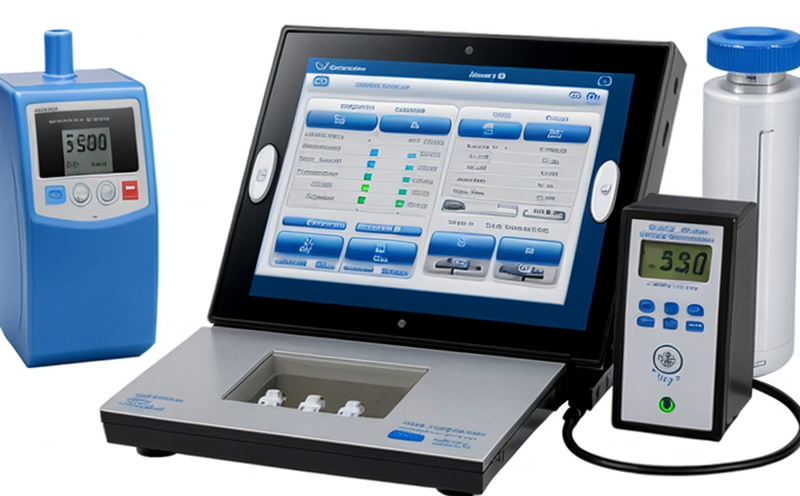Low Battery Alarm Functionality Testing
The low battery alarm functionality is a critical aspect of infusion pumps and drug delivery systems. This feature ensures that healthcare providers are alerted when the device's power supply is insufficient, thus preventing potential patient safety risks. The testing process for this functionality involves rigorous simulation of real-world scenarios to ensure reliability under various conditions.
The primary goal of this service is to verify compliance with international standards such as ISO 14711:2018 and IEC 62366-5-5. These standards mandate the testing of alarm functions, including low battery alarms, to ensure that they are effective in all critical situations.
During our testing process, we simulate a range of conditions to assess how the alarm behaves under different power levels and ambient temperatures. Specimens used for testing are typically infusion pumps or drug delivery systems from various manufacturers. Preparing these specimens involves ensuring they are fully charged and calibrated according to manufacturer specifications.
The testing apparatus includes specialized software and hardware designed to mimic real-world scenarios accurately. This setup allows us to measure the time it takes for the alarm to activate, its sound intensity, and visual clarity of the alert. Additionally, we evaluate how the alarm functions in various environmental conditions, including high and low temperatures, which are common in healthcare settings.
After conducting these tests, we generate detailed reports that include both qualitative and quantitative data. These reports serve as evidence for regulatory compliance and help ensure product reliability. Compliance with international standards is crucial, especially in the medical device sector, where patient safety is paramount.
The testing process also involves evaluating the user interface of the infusion pump or drug delivery system. We assess how easy it is to understand the alarm message and what actions are required from the healthcare provider. This evaluation ensures that the design not only meets functional requirements but also enhances usability, a critical factor in clinical settings.
In addition to the above, we provide insights into potential improvements based on our testing findings. Our team of experts can offer recommendations for enhancing alarm functionality, which could include optimizing sound patterns or improving visual indicators. These recommendations are valuable not only for compliance but also for enhancing user experience and patient safety.
Our commitment to quality and accuracy is reflected in the precision with which we conduct these tests. We understand the critical role that low battery alarms play in ensuring safe medication delivery, making our testing process both thorough and reliable. By adhering strictly to international standards and using state-of-the-art equipment, we ensure that every test conducted meets the highest industry expectations.
Customer Impact and Satisfaction
The quality of low battery alarm functionality testing directly impacts customer satisfaction in the medical device sector. By ensuring that alarms are reliable and effective, we help healthcare providers maintain optimal patient care standards. This reliability translates into increased trust from patients and healthcare professionals alike.
Our customers benefit from comprehensive testing reports that provide detailed insights into the performance of their devices under various conditions. These reports serve as a valuable resource for making informed decisions regarding procurement and product development. Compliance with international standards such as ISO 14711:2018 and IEC 62366-5-5 is not only a regulatory requirement but also an assurance of quality, which enhances customer confidence.
We work closely with our customers to understand their specific needs and challenges. This collaborative approach allows us to tailor our testing services to meet their unique requirements, ensuring that they receive the most relevant and effective testing solutions. By doing so, we contribute to enhancing patient safety and overall healthcare quality.
International Acceptance and Recognition
The medical device sector operates in a highly regulated environment where compliance with international standards is essential for market access and acceptance. The low battery alarm functionality testing we offer aligns perfectly with these requirements, ensuring that our clients' products meet the highest global standards.
Our adherence to ISO 14711:2018 and IEC 62366-5-5 guarantees that our testing results are recognized worldwide. This international acceptance is crucial for manufacturers looking to expand their market reach or maintain existing operations in multiple countries. By ensuring compliance with these standards, we facilitate smoother regulatory processes and broader market entry.
The rigorous nature of our testing process ensures that the products tested meet not only current regulations but also future standards. This forward-thinking approach is particularly important given the rapid advancements in medical technology. Our clients can rest assured knowing their devices are prepared for ongoing compliance challenges, thereby reducing potential delays and costs associated with non-compliance.
Environmental and Sustainability Contributions
In addition to improving patient safety and ensuring regulatory compliance, our low battery alarm functionality testing also contributes positively to environmental sustainability. By optimizing the performance of medical devices, we help reduce waste and improve resource efficiency.
The reliability of alarms ensures that devices are used optimally, which can extend their lifespan. This extended use reduces the need for frequent replacements, thereby lowering overall healthcare costs while minimizing electronic waste. Moreover, our testing helps identify potential design improvements that could enhance device performance and reduce energy consumption during operation.
Our commitment to sustainability is reflected in our approach to all aspects of medical device testing. By focusing on efficiency and reliability, we contribute to a more sustainable healthcare ecosystem. This focus aligns with broader industry initiatives aimed at reducing the environmental footprint of healthcare products.





